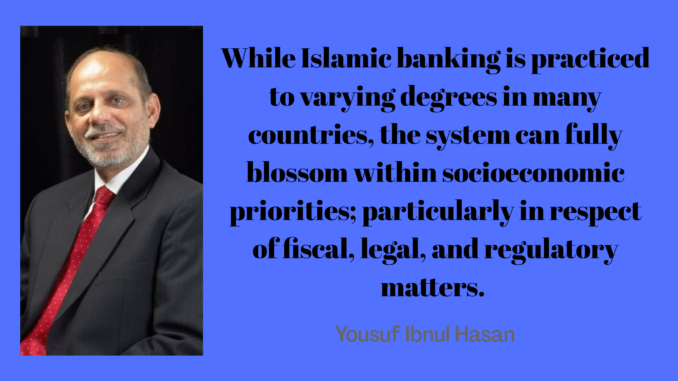
Centuries ago, banking started on a bench and today high-rise buildings, fancy offices, and thousands of employees are often involved in using public funds for lending without considering social responsibilities for the community, environmental perils, immoral, or unethical purposes. Islamic Banking differs from conventional banking but does not force the masses to obey Islam.
Conventional Banking
Conventional Bank is a shop that buys money and sells the money. The income on money trade is an interest or a price as money is being treated as a commodity instead of as a medium of exchange. The bank does not serve for the societal benefits and keeps economic activities in order to earn targets from the growth of an individual or institutions by providing an umbrella in fair weather and asks for a return when it begins to rain. The passion is to trade in money through community needs and serve their institutions through interest income at first, whereas the importance of community is secondary.
Conventional banks may sometimes emphasize more wealth, more domination and extreme exploitation by lending money on a fixed return of interest with a purpose to earn it rightly or wrongly. Money is priced using the rate on the principal loan without consideration of purpose but guaranteed for repayment at a fixed date. The capital of the bank is secured and risk is taken on public deposits. The depositor’s risk has less share of profit whereas the bank’s profit share is higher with ZERO risks of Capital.
Islamic Banking differs from conventional banking and does not force the masses to obey Islam
Islamic Banking
In 1958 the concept of Islamic economy was introduced with its strong financial system for banking, parallel to conventional banking. It was the brainchild of Dr. Ahmed Al Najjar, an Egyptian economist who led this financial movement and in 1962 established the first social bank, naming it “Mitgmir Saving Bank”. He introduced the money as a source and human ability and efforts as a force. Bank lending was replaced by bank financing in participation as an “equity” instead of a liability to the user. Profit and loss was to be shared between bank and client at pre-agreed “Ratio” on net profit or loss instead of fixing a “Rate of Return” on the lending amount without results.
Money as Potential Capital
Islamic banking introduced money as potential capital and it becomes actual capital only when it joins hands with other resources to undertake a productive activity. Islam recognizes the time value of money but only when it acts as capital and not when it is potential capital. Islamic banking treat the volume of money is the value of commodity and services and money as a medium of exchange.
Islamic Banking differs from conventional banking as it emphasizes the transparency in financial dealings for the purpose of participation between banks and the users of finance.

Islamic Banking Products
Islamic banking has developed financial products for its monetary and banking operation, which include Islamic Takaful for risk protection; Modaraba for “Ability” financing; Musharka for “Equity” financing; Morabaha for “Commodity” financing; and Ijarah for “Assets” financing.
For the mobilization of financial resources, “Sukuk” is the financial instrument that structures the capital base for a project or transaction. Sukuk is tradable and non-tradable in the secondary market as an alternate to Shares and Debenture which are forbidden in Islamic banking due to uncertainty in its market value which fluctuates without having economic activities. Whereas conventional banking actively deals in these such products.
Concept of Social Banking
Islamic banking is social banking and known as Massraf (Purpose). It identifies the role of Man, Money, Commodity, and Services as the factor of production for economic activities under social priorities and responsibilities to eliminate inflation, black-marketing, and holdings of essentials for human needs. It promotes the documented economy and guards against the growth of the black economy. Islamic banks groom the banker who is taken as AMEEN (Trustee) and should be “Wise”, “Honest” and worthy to be an entrepreneur. He must be aware of societal importance in commercial and financial matters that is not considered a priority for conventional bankers.
Decentralized System
Islamic Banking is a decentralized system with a valid objective to serve on fast track decisions and keep implementing social responsibility for the elimination of Riba (bad income, earning, profit or benefits) from the financial matters and create awareness for financial responsibility by sharing of wealth for socioeconomic stability. Conventional banks work on a centralized system due to risk, income, and importance of money rather than a client’s opportunities.
Islamic banks boost the saving conduct and invest these savings in participation in the right direction so as to curb the prices, guard against monopolization, discrimination between retail and corporate client, and respect the customer as a potential strong pillar of the institution.
Building Relationships
Islamic Bank gives importance to developing the relationship between Islamic and non-Islamic banking institutions through strong treasury facilities, trade relations, equity participation, and syndications and venture financing.

Islamic Banks are not religious houses, but their system demands honesty, humbleness, transparency, and fair monetary dealing. Exploitation and injustice to gain is prohibited and performance can only be through participation, trust, and confidence between bank and clients who are taken as a participator in the commercial operations of the bank and not for religious matters.
Islamic banking allows the use of funds only for commercial purpose and not for charity purposes. Support for social cause can only be met through the bank’s profit and not from its capital or client’s funds. It is not necessary that Islamic banker be only be Muslim by faith, however, the banker must be aware of Islamic values for Islamic economics and understand how to serve the community, irrespective of race, religion, sect, color, language, or status.
Prohibited Activities
Lust of high return in the shape of interest through monetary assistance for unethical businesses, speculation, deduction of charges without informing the account holder, bypass and superseding in business deals, deprivation of financial share in a business transaction, obtaining services without payments, over charging, monopoly, black-marketing, holdings, tax evasion, smuggling and conspiracies against the law of the state, activities with no consideration of law breaking or insult to legality, ignoring community development and any earning by ignoring these bindings fall in Riba practice which is prohibited in Islamic banking.
While Islamic banking is practiced to varying degrees in many countries, the system can fully blossom within socioeconomic priorities, particularly in respect of fiscal, legal, and regulatory matters. The major hurdles faced by the Islamic bank are the absence of a necessary legal system and the lack of trained, skilled, and adequate manpower for Islamic banking and investment fields. The system still has many hurdles to cross. But Islamic economics has clearly defined the remedies. For better banking, the best solution is actions that are judged by intentions.
About the author
Yousuf Ibnul Hasan is an Islamic banker since 1982. He is also serving as a teacher, trainer, columnist, broadcaster, and Program Consultant Islamic banking and Applied Finance. He can be contacted through his email pride4pen@gmail.com.
This article was originally published in The Accountant’s Diary on November 29, 2020.







